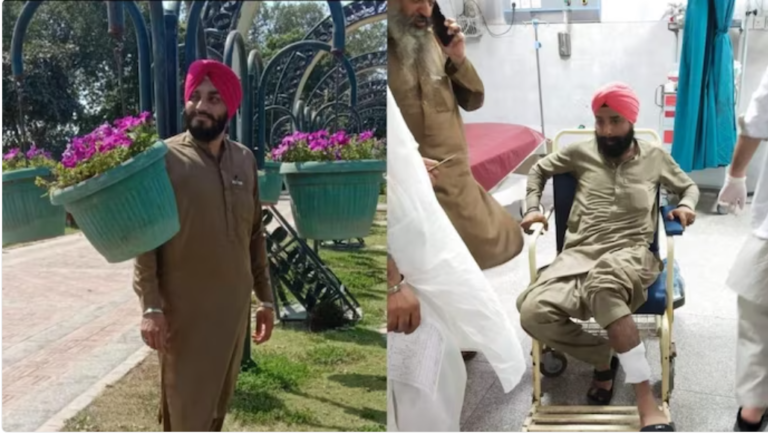
A Sikh trader was shot dead when unidentified motorcyclists opened fire at him in Peshawar on Saturday, raising fear in the minority community as targetted attacks continue unabated in the Khyber Pakhtunkhwa province.
Manmohan Singh was going home in a rickshaw when the assailants killed him. This was the second attack on a Sikh over the past 24 hours, as another Sikh trader, Tarlok Singh, got injured after he was shot at by unidentified men on Friday. He sustained bullet wounds in his leg.
The police have described such attacks as targeted killings, which are aimed at spreading unrest in the province.
Ashfaq Anwar, the capital city police chief officer, has vowed to soon arrest the suspects and bring them to a court of law. He met with the community leaders and assured them of complete support.
According to KP IGP Akhtar Hayat Gandapur, a banned terrorist organisation was behind the attack. His claim was right as the outlawed Islamic State – Khorasan Province, which many believe is in Afghanistan, has claimed responsibility for the attack.
The police have formed a “special team” to trace the anti-state elements. The complaint registered at the CTD police station has invoked terrorism charges. The police have claimed to have arrested many suspects as they review the CCTV footage.
SIKH MIGRATION
A Sikh leader said the targeted killings and unrest were prompting the Sikh community to migrate south and abroad.
“The population of Sikhs was more than 35,000 in Khyber Pakhtunkhwa, however, due to targeted killing and unrest most of the families have migrated to Punjab or abroad,” Ridesh Singh said.
“Twenty-nine people have been killed and four injured since 2012 in targeted attacks,” Singh said and added that before 2012 there were reports of abduction and extortion being taken from them.
He lamented that in many cases, the accused have still not been arrested and in which the suspects were arrested, most of them were acquitted by the court due to lack of evidence. He blamed poor investigation and failure of the police for this.
“If the security of the Sikh community is to be ensured, first of all, a committee headed by the police should be formed to prepare a security plan in the Sikh populated areas or markets, and the security of the respective places should be strict and practical,” Singh said.
While reacting to the attacks, Caretaker Information Minister Jamal Shah Kakakhel said the attacks on the minority community were an attempt to disturb the peace in the province.
Many analysts believe that militants attack police and minorities to spread fear in the area as such elements were soft targets.
ANP’s provincial president Aimal Wali Khan spoke in the same vein, citing that by attacking the minority an impression was given that Peshawar was not safe. He was concerned over the rise in terrorist attacks in the province, which has suffered the most in the war against terrorism.
“Unfortunately, even today no action is being taken against those people who were accomplices of terrorists,” he said and demanded strict action against those who brought terrorists back to the country.
Troublemakers made their presence felt in KP almost a year ago. The ruling alliance blames the previous government for allowing the members of the banned outfit here under a series of dialogue processes. The PDM-run government believes such concessions have led to a rise in militancy in the country. But the PTI denies such accusations.
Time after time rights activists have called for the implementation of the former chief justice of Pakistan Tassaduq Hussain Jillani’s directive regarding the rights of religious minorities.
In 2013, a three-member led by the-then CJP Jillani had taken suo motu notice of the Peshawar Church attack. The double suicide bombing killed more than 100 people on September 22, 2013.
In its verdict, the Supreme Court had ordered for the constitution of a national council of minorities’ rights. The function of the said council should be to monitor the practical realisation of the rights and safeguards provided to the minorities under the constitution and law, said the detailed 32-page decision.
The apex court had also ordered the formation of a special task force to protect minorities’ worship places, saying: “Special Police Force [to] be established with professional training to protect the places of worship of minorities.”
The proposed task force would devise a strategy to ensure the protection of minorities rights.
“In all cases of violation of any of the rights guaranteed under the law or desecration of the places of worship of minorities, the concerned Law Enforcing Agencies should promptly take action including the registration of criminal cases against the delinquents,” said Jillani.